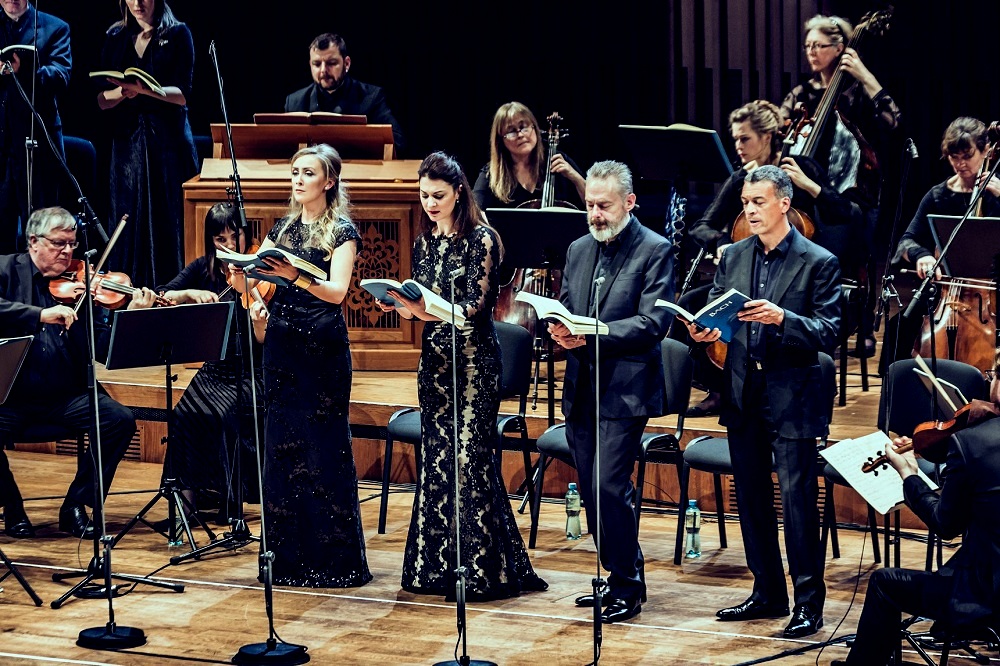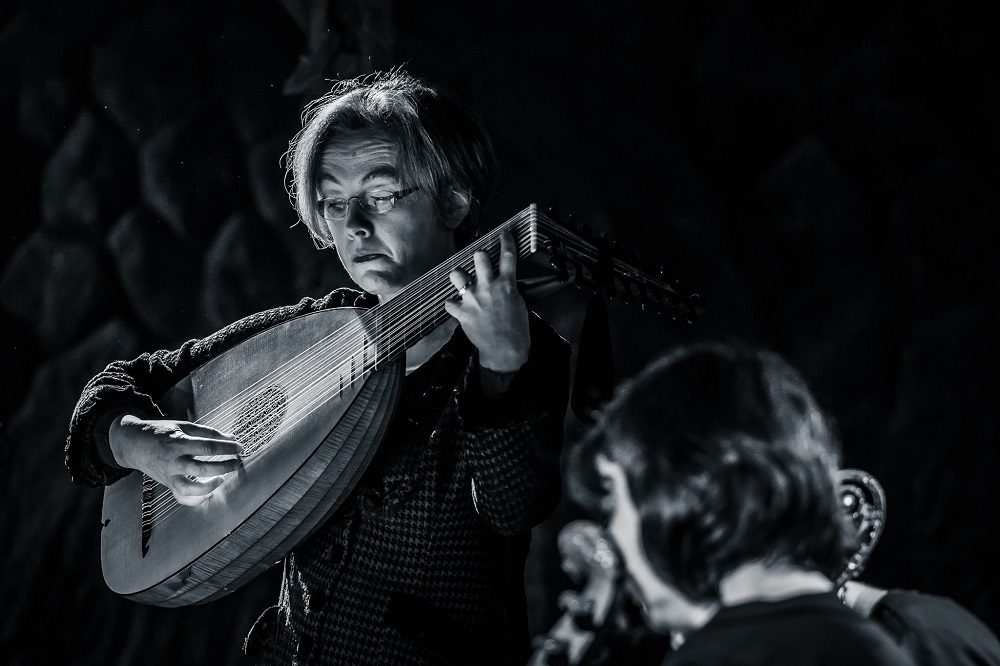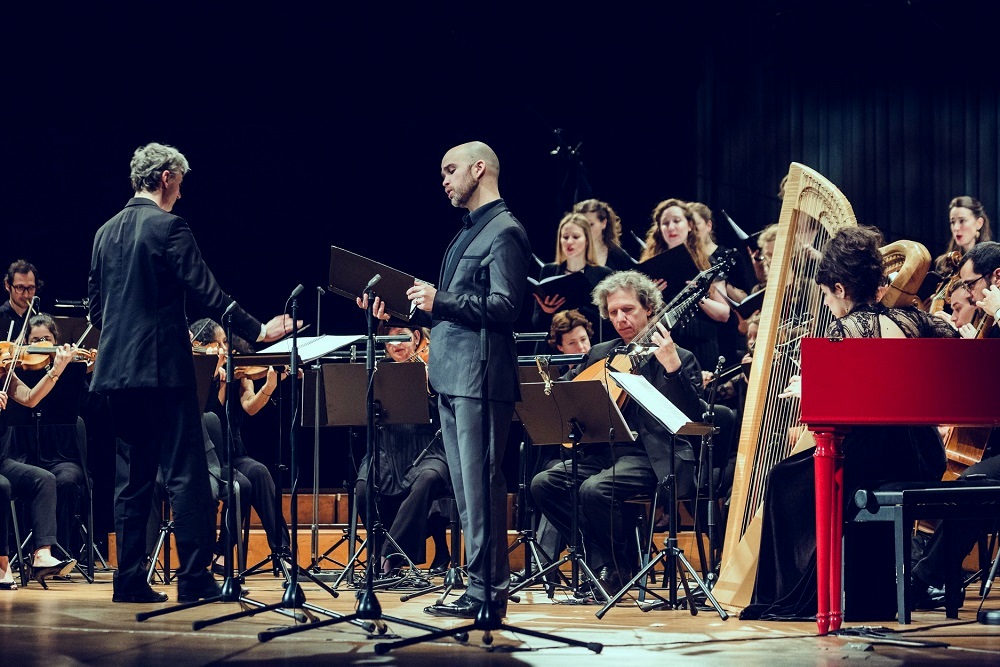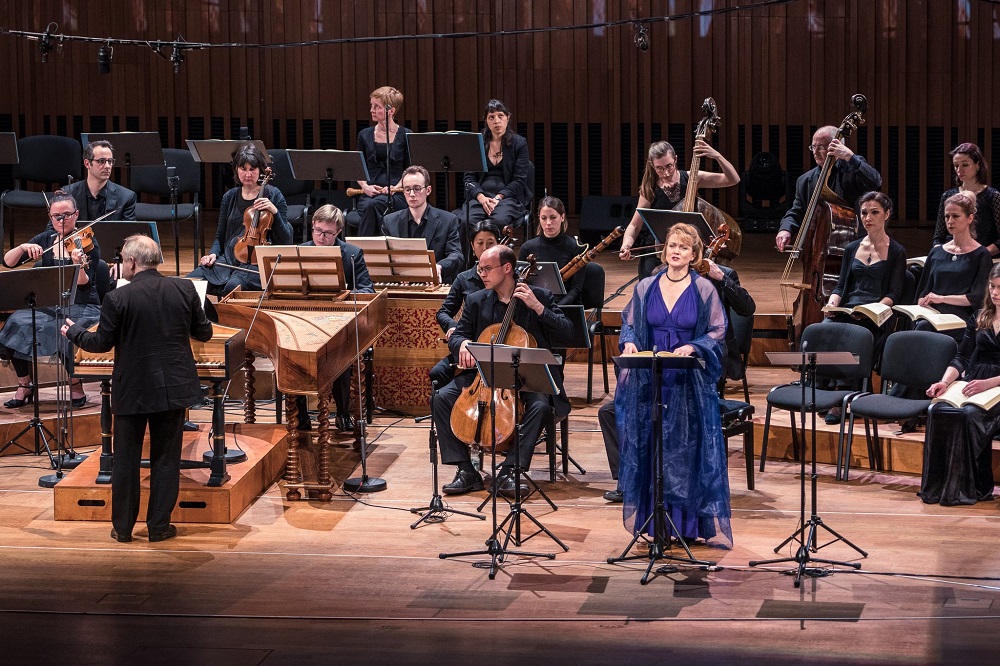Held annually every Holy Week, Kraków’s Misteria Paschalia is one of the continent’s most vibrant early music festivals. With an increasing focus on international collaborations, the 2018 edition welcomed Edinburgh’s Dunedin Consort as artists in residence, and their director, Professor John Butt, as Resident Artistic Director. With early British sacred music at the fore, other European exponents of the genre included Phantasm, the Marian Consort, the Orchestra of the Age of Enlightenment and last year’s artists in residence, Le Poème Harmonique.
Visiting over the Easter weekend, the first concert I attended was Bach’s St Matthew Passion performed by the Orchestra and Choir of the Age of Enlightenment, a fitting programme choice for Good Friday. This took place in the festival’s main venue, the ICE Krakow Congress Centre, a modern, multi-tiered concert hall that hosts visiting orchestras and choirs, situated on the banks of the river Vistula that runs through the city. With no conductor, the musicians’ synergy and empathy with one another was imperative, and though it worked up to a point, the negatives of having no one person taking the reins sadly outweighed the positives. Mark Padmore, in the role of the Evangelist, was also listed as Director, but his on-stage direction was minimal at most, leaving the orchestra to their own devices.  As a result, this was a performance which was rhythimically tight and together, but taken at a somewhat leisurely pace and lacking in energy. Perhaps Padmore clearly placed great importance on the text; he is, undoubtedly, an excellent Evangelist, and his narration of the story was filled with clear and engaging recitative. The young tenor Hugo Hymas - certainly one to watch on the early music scene - sang with a beautiful sweetness, although the most moving performance came from Roderick Williams as he sang Christ’s dying words (pictured above on the right with Louise Kemeny, Claudia Huckle and Padmore). The chorale passages were delivered with a sombre stateliness, though the lethargic tempo rendered them in danger of plodding as opposed to gliding. A musically robust performance, although a certain magic was sadly lost with nobody spurring it on from the podium.
As a result, this was a performance which was rhythimically tight and together, but taken at a somewhat leisurely pace and lacking in energy. Perhaps Padmore clearly placed great importance on the text; he is, undoubtedly, an excellent Evangelist, and his narration of the story was filled with clear and engaging recitative. The young tenor Hugo Hymas - certainly one to watch on the early music scene - sang with a beautiful sweetness, although the most moving performance came from Roderick Williams as he sang Christ’s dying words (pictured above on the right with Louise Kemeny, Claudia Huckle and Padmore). The chorale passages were delivered with a sombre stateliness, though the lethargic tempo rendered them in danger of plodding as opposed to gliding. A musically robust performance, although a certain magic was sadly lost with nobody spurring it on from the podium.
Fortunately that was not the case for the remainder of the weekend’s performances. Holy Saturday’s earlier concert took place in the most unusual venue of a chapel deep under the ground, in the Wieliczka Salt Mines, just a few miles southeast of Kraków. It's not for the claustrophobic; audience members are packed like sardines into a lift, which takes only 30 at a time, and are plunged into an eerie, dark, underground world.The chapel is certainly a striking place. Walls of charcoal grey, almost black salt have stunningly intricate biblical scenes carved into them, and the alcove is illuminated by a series of elaborate chandeliers. The subterranean chamber has a strange feel to it, but there’s no denying it makes for a wonderful acoustic. The British but now Berlin-based viol consort Phantasm, joined by lutenist Elizabeth Kenny (pictured above), gave a stirring performance of Dowland’s Lachrimae, with every note at once clear and crisp yet beautifully rounded. The constant temperature of the chapel is said to be of particular benefit to period instruments, since it won’t alter the pitch, although quite some time was still spent tuning between numbers. An over-cautious approach to the intonation maybe, but certainly one which paid off as the tuning was impeccably tight throughout. Kenny is a joy both to listen to and to watch. Her intricate ornamentation is as natural as it is detailed, and her leadership of the viols beautifully sensitive to the music. The lush dissonances teased out during the pavans were deliciously wistful and the rhythmic interplay displayed in the dance movements gave an infectious, impish quality with a real swing.
The British but now Berlin-based viol consort Phantasm, joined by lutenist Elizabeth Kenny (pictured above), gave a stirring performance of Dowland’s Lachrimae, with every note at once clear and crisp yet beautifully rounded. The constant temperature of the chapel is said to be of particular benefit to period instruments, since it won’t alter the pitch, although quite some time was still spent tuning between numbers. An over-cautious approach to the intonation maybe, but certainly one which paid off as the tuning was impeccably tight throughout. Kenny is a joy both to listen to and to watch. Her intricate ornamentation is as natural as it is detailed, and her leadership of the viols beautifully sensitive to the music. The lush dissonances teased out during the pavans were deliciously wistful and the rhythmic interplay displayed in the dance movements gave an infectious, impish quality with a real swing.
The evening’s later concert, held back at the ICE Krakow, had an equally curious dimension, albeit in a very different way. A French group performing quintessentially English music in Poland is not something one hears every day. Son of England: English Funeral Music of the 17th Century, was a semi-dramatic setting of works by Purcell and Jeremiah Clarke performed by Le Poème Harmonique with singers from Les Cris de Paris under the superb direction of Vincent Dumestre. This was an astounding performance, with some wonderful solo singing, especially from tenor Zachary Wilder (pictured below by Angielska Muzyka). Purcell’s Welcome to all the pleasures was lightsome yet dignified, while Clarke’s Ode on the Death of Henry Purcell evoked a more melancholy mood, the layering up of the chorus in "Oh Dismal Day" being particularly expressive.  Moving back to Purcell, the performance closed with his Funeral Sentences for the Death of Queen Mary, and was given sombre dramatic effect with clever use of lighting, and timpanist Samuel Domergue leading a group of players off stage as their sound faded away to silence. Some artistic licence may have been utilised here - a harp amongst the orchestra for instance - but taking a less historically rigorous approach to the performance on this occasion only added to the charm.
Moving back to Purcell, the performance closed with his Funeral Sentences for the Death of Queen Mary, and was given sombre dramatic effect with clever use of lighting, and timpanist Samuel Domergue leading a group of players off stage as their sound faded away to silence. Some artistic licence may have been utilised here - a harp amongst the orchestra for instance - but taking a less historically rigorous approach to the performance on this occasion only added to the charm.
Liturgically perhaps an unusual choice was Easter Sunday's performance of Handel’s Samson, with the Dunedin Consort - led from the Harpsichord by John Butt - and the Polish Radio Choir. This was a robust and fine performance, with tenor James Way showing a huge amount of vocal dexterity and stamina in the title role. Eleanor Dennis as his treacherous wife Dalila has a clear and arresting voice, though she was a little stiff and staid much of the time. Moments of vocal freedom shone through in some of her more melismatic passages, but had she been as relaxed throughout her Dalila would have been more convincing. The other soprano roles were sung by Fflur Wyn, who was bright and sunny as the Israelite woman, and Charlotte Ashley as the Philistine woman, whose singing vastly improved as the night went on. From a fairly lacklustre aria in the first act, her a capella in the third was calm and ethereal. The most impressive solo vocal performance of the night however was given by Australian mezzo Caitlin Hulcup, who sang the role of Samson’s friend Micah with a deep velvetiness and dark, dusky hues (pictured below).  The chorus was spectacular, comprising Dunedin’s vocalists and the singers of the Polish Radio Choir - rigorously rehearsed by their new Chorus Master Maria Piotrowska-Bogalecka. They performed with the power of a full orchestral chorus, not the chamber choir-sized group which was on stage, with an incredible depth of light and shade. The orchestra - a pretty large band by Dunedin’s usual standards, with guest players from the Scottish Chamber and BBC Scottish Symphony Orchestras - was lean and spry, eminating an infectious energy, led by Cecilia Bernardini. It’s been an intense time for this group. Having arrived in Kraków straight from performances at the Wigmore Hall, this is their second oratorio performance at the festival. They opened it with a Messiah on Monday and they’re making a recording while in Poland too, of Handel’s Ode to St Cecilia’s Day, to come out on Linn records in September.
The chorus was spectacular, comprising Dunedin’s vocalists and the singers of the Polish Radio Choir - rigorously rehearsed by their new Chorus Master Maria Piotrowska-Bogalecka. They performed with the power of a full orchestral chorus, not the chamber choir-sized group which was on stage, with an incredible depth of light and shade. The orchestra - a pretty large band by Dunedin’s usual standards, with guest players from the Scottish Chamber and BBC Scottish Symphony Orchestras - was lean and spry, eminating an infectious energy, led by Cecilia Bernardini. It’s been an intense time for this group. Having arrived in Kraków straight from performances at the Wigmore Hall, this is their second oratorio performance at the festival. They opened it with a Messiah on Monday and they’re making a recording while in Poland too, of Handel’s Ode to St Cecilia’s Day, to come out on Linn records in September.
Such a level of concentration resulted in a deeply distilled shared musicianship that was evident in their crisp, energised sound. The relationship between the Dunedin Consort and the Misteria Paschalia festival has clearly been a positive one, not only for the musicians on stage who have forged fruitful partnerships, but for the relationship between performers and the festival’s audiences too, whether from Poland, Britain or elsewhere in the world.














Add comment